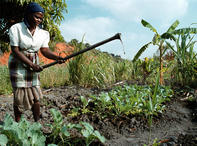Dropping Numbers
There has been a change in the tidal nature of migration in and out of Lesotho: the number of Basotho miners has dropped from 100 000 to just 46 000 since 1990 due to retrenchments and job cuts, and increasingly these men are older and married, where previously they were younger and single.

Meanwhile, the number of women migrating both inside Lesotho and beyond is growing. Mostly, they are out looking for domestic worker jobs, but some go into textiles, become farm labourers, do something in the informal sector or are self-employed. A small number of Lesotho’s exports are professionals or skilled manual labourers, according to the South African Migration Project (SAMP) research.
Women migrants tend to earn less (as much as a third of what the men do, being ‘notoriously exploited’, according to SAMP), although the women are often more fastidious about sending money home. Surprisingly, even though the number of Basotho men heading to the South African mines has dropped, the amount of remittance money flowing back into Lesotho from the mines has increased during this time as a result of rising wages.
Only Source of Income
What the change in migration means is that more money is going to fewer households. The upshot is that this is driving a wedge deeper between the haves and the have-nots in Lesotho. It is increasing inequality between households and accelerating levels of poverty and food insecurity for households that do not have a mineworker. This is one of the key criticisms of the detractors of the migrant labour system.
While some proponents argue that repatriated migrant wages foster development, critics point out that even though remittance money is important for many families’ day-to-day survival, it tends to get used for consumption – food, household necessities and the like – rather than getting ploughed into ‘income-earning, job-creating investment’, according to SAMP.
A good chunk of the wage earned by the miner is spent in South Africa rather than getting shipped back home, and some miners have second families on the mines, meaning even less money gets repatriated. For many homes of migrant workers, this is the only source of income they have.
A family may have someone living with them who collects a small social grant from the state, and have another R100 coming in each month from a little side business, but this usually not the norm. Due to the dependence on remittances in many households, the money is key to the family getting access to food.
Benefits Come With Hardships

Of the families surveyed in 2005 as part of research initiated by SAMP, the bulk of remittance money is spent on food, followed by clothes, school fees and then transport fares. The families of miners are better off than those who do not have someone shipping out across the border to get work, and the benefits of a migrant labourer’s income might well extend beyond the immediate family.
Even though the perception among most communities is that migration is a good thing, and that the money helps families meet their daily needs, there is no denying the hardships involved.
The personal and social costs of the migratory life, according to SAMP, are the loneliness, the being away from home for too long and a resulting family arrangement that places ‘too much responsibility on family members left behind’. The same applies regardless of whether the migrant is male or female.
The Young Generation
This kind of life means that a father may miss the birth of his first child. One wife recalls: “He was at work. He was away on the mines. Same for the third born. But he was home when I went into labour with our son, the middle child. He took me to the hospital but he didn’t go into the labour ward.”. That child is fifteen now, the kind of age when disciplining him without a father at home can be tough.
He does not like to do the gardening. But there is a sense of inevitability to his own story: the sons of mineworkers become mineworkers. Just as his father’s own father took him off to the mines a quarter of a century earlier, there is the potential for his father to do the same with his own male child. A bitter-sweet passing of the baton from one generation to the next.
His mother would much rather her son became a doctor. ‘I don’t want him to go to the mines. Ehhe...’ She chuckles without a flicker of humour, probably thinking about the implications for her boy. ‘I don’t like him to go there because people are being overworked and there are too many accidents.’ His father does not want his son on the mines either, and he has told his boy as much.
‘I told him that the mine is not a place to work. It is just a job for someone who has no other options.’ Thankfully, the teenager has plans of his own. ‘Eh-hehehe,’ the buxom mother laughs, ‘he wants to be a driver at Sasolburg. A truck driver. He keeps motivating that there’s a lot of money given to truck drivers in Sasolburg.’
His older sister wants to get some kind of tertiary qualification in business management, but she is still casting about with the local colleges to see if she can get in.
If she does, she might well end up joining the growing number of younger, skilled people who are heading out of Lesotho these days in search of work – a new generation of migrants, not the vulnerable, exploitable, low-paid miners, domestic workers or farm labourers, but the kind of migrant whose path out of Lesotho might constitute being part of the ‘brain drain’. The other sister, meanwhile, wants to work in a bank.
By Leonie Joubert